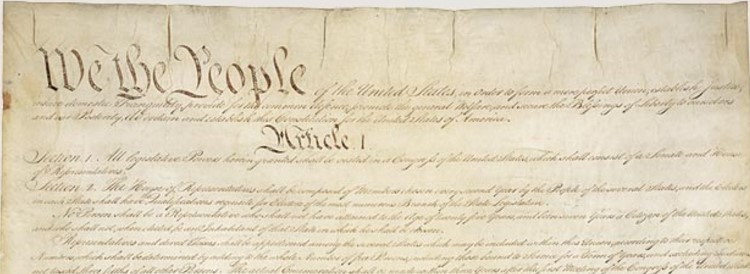Okay, back to work. Remember friends – layman here. I’m interpreting the text as it seems clear to me.
The President shall be Commander in Chief of the Army and Navy of the United States, and of the Militia of the several States, when called into the actual Service of the United States; he may require the Opinion, in writing, of the principal Officer in each of the executive Departments, upon any Subject relating to the Duties of their respective Offices, and he shall have Power to grant Reprieves and Pardons for Offences against the United States, except in Cases of Impeachment.
The President is the Commander in Chief of the Army and the Navy, as well as state militias when they are called into service.
If the President needs information about any of the executive departments, it is allowed to require that information or opinion in writing.
The President may grant reprieves or pardons for Federal offenses. The one exception is that if someone is impeached, the President may not issue a pardon. (Yes, Ford issued Nixon a pardon. Nixon also resigned before he could be impeached).
He shall have Power, by and with the Advice and Consent of the Senate, to make Treaties, provided two thirds of the Senators present concur; and he shall nominate, and by and with the Advice and Consent of the Senate, shall appoint Ambassadors, other public Ministers and Consuls, Judges of the supreme Court, and all other Officers of the United States, whose Appointments are not herein other- wise provided for, and which shall be established by Law: but the Congress may by Law vest the Appointment of such inferior Officers, as they think proper, in the President alone, in the Courts of Law, or in the Heads of Departments. The President shall have Power to fill up all Vacancies that may happen during the Recess of the Senate, by granting Commissions which shall expire at the End of their next Session.
Treaties must have a 2/3 majority in the Senate to pass, but it is the President’s power to negotiate said treaties. The President does appoint ambassadors, Supreme Court Justices, and other positions of government responsibility not specifically spelled out in the Constitution, but have been established by law. (Meaning Congress has established the position…) Congress can give permission for appointments without approval if they want to. When the Senate is in recess, the President can fill any vacancies of these positions, but has to put an expiration date of the end of the next Senate session on them.
As an aside: While I am re-reading this, I am noticing that the President has considerably less legal power than is popularly believed.

